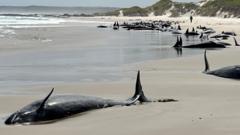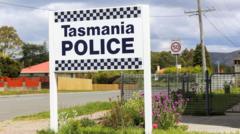In a distressing incident on a remote beach in Tasmania, more than 150 false killer whales have been reported dead or will face euthanasia following a mass stranding. According to Tasmania's Department of Natural Resources and Environment, the pod of 157 whales came ashore near Arthur River in the island’s north-western region.
Witnesses observed approximately 90 of the animals still alive on Wednesday, but specialists noted that complex conditions have thwarted any chance of rescue. Historically, Tasmania has seen mass strandings, including the worst recorded event in 2020, yet this marks the first mass stranding of false killer whales in over half a century.
False killer whales, a species classified among the largest types of dolphins, are known to reach lengths of up to 6 meters (19 feet) and can weigh as much as 1.5 tonnes. Reports indicate the pod had been stuck on the beach for between 24 to 48 hours, with surviving whales exhibiting signs of severe stress.
Local resident Jocelyn Flint shared her sorrow with the Australian Broadcasting Corporation after she discovered the pod while out shark fishing. "There are babies... Just families of them. Their eyes are open, they're looking at me, like 'help'," she expressed, describing the scene as "absolutely horrific."
The stranding site, located about 300 kilometers from Launceston, presents formidable challenges in terms of accessibility. Marine biologist Kris Carlyon emphasized the difficulty of getting rescue operations underway due to the steep and rough terrain. The area is accessible only by four-wheel drive vehicles, which severely limits the transport of rescue equipment.
In attempts to assist the stranded whales, wildlife experts made efforts to relocate and refloat two of the surviving whales. However, the harsh conditions left them unable to navigate away from the shoreline. "They just keep turning around and coming back towards the beach," explained Shelley Graham from Tasmania's Parks and Wildlife Service.
As the forecast predicts similar rough conditions for the following days, wildlife veterinarians faced a difficult decision to euthanize the remaining whales to prevent prolonged suffering. "Euthanasia is always a last resort," reiterated Dr. Carlyon, underscoring the gravity of the situation.
The daunting task of euthanizing these animals will begin Wednesday and extend into Thursday. Authorities are also considering the disposal of the carcasses, with cultural heritage implications for Aboriginal peoples in the area influencing potential decisions.
With over 80% of Australian whale strandings occurring in Tasmania, the region has a troubled history of such events. Notably, around 470 pilot whales stranded further south at Macquarie Harbour in 2020, with 350 fatalities despite rescue attempts, and another 200 whales stranded in the same location in 2022.
Experts continue to research the reasons behind these strandings, which often involve the social nature of whales and their tendency to travel in tightly-knit groups. Some theories suggest that the animals may become disoriented while hunting, inadvertently leading groups ashore.
Tasmania's unique geography and challenges present ongoing concerns as locals and authorities grapple with the profound implications of such tragic events.




















